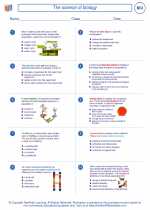Selenium in Biology
Selenium is a trace element that is essential for the proper functioning of various biological processes in organisms. It is a key component of several important proteins, including selenoproteins, which play critical roles in antioxidant defense, thyroid hormone metabolism, and immune function.
Functions of Selenium
- Antioxidant Defense: Selenium is a crucial component of the enzyme glutathione peroxidase, which helps protect cells from damage caused by reactive oxygen species.
- Thyroid Function: Selenium is required for the production and metabolism of thyroid hormones, which play a key role in regulating metabolism and growth.
- Immune Function: Selenium is involved in the proper functioning of the immune system, contributing to the body's defense against infections and diseases.
Sources of Selenium
Selenium is found in various foods, including seafood, organ meats, Brazil nuts, and certain grains. The selenium content of plant-based foods is influenced by the selenium content of the soil in which the plants are grown.
Deficiency and Toxicity
A deficiency of selenium can lead to health problems such as muscle weakness, fatigue, and increased susceptibility to infections. On the other hand, excessive selenium intake can lead to toxicity, which may manifest as hair and nail brittleness, gastrointestinal disturbances, and neurological symptoms.
Study Guide
To effectively study the topic of selenium, it is important to focus on the following key points:
- Understand the biological functions of selenium, including its role in antioxidant defense, thyroid function, and immune function.
- Identify dietary sources of selenium and the factors that can influence selenium content in foods.
- Recognize the symptoms of selenium deficiency and toxicity, as well as the potential health consequences associated with these conditions.
- Consider the importance of selenium in maintaining overall health and well-being, and its relevance in the context of human nutrition and biology.
By grasping these fundamental concepts, you will be able to develop a comprehensive understanding of selenium and its significance in biological systems.
.◂Biology Worksheets and Study Guides High School. The science of biology

 Worksheet/Answer key
Worksheet/Answer key
 Worksheet/Answer key
Worksheet/Answer key
